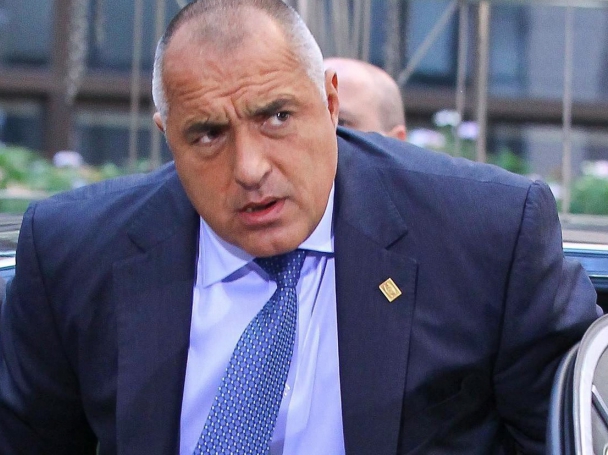Bulgaria’s Ex-Premier Nears Return to Power in a Key Election for Europe

Boiko Borisov, center, spoke to members of the news media in Sofia on Sunday as his party held a narrow lead in parliamentary elections in Bulgaria. Credit Dimitar Dilkoff/Agence France-Presse — Getty Images
SOFIA, Bulgaria — The former prime minister of Bulgaria verged on retaking power Sunday as his center-right party held a narrow lead in a contested election, a sign that Bulgarians still see their future lying with the European Union.
While official results were not expected until Monday, it appeared that the former leader, Boiko Borisov, would form a new government in Bulgaria, the European Union’s poorest member, probably in a coalition with an alliance of smaller right-wing nationalist parties.
The Socialists, who had advocated stronger ties with Russia and had vowed to block a renewal of European Union sanctions against the Kremlin, could not convince enough voters that they were the better alternative and conceded defeat.
The result appeared to be a disappointment for President Vladimir V. Putin of Russia, who has sought to exploit divisions in the European Union to strengthen Russia’s influence — particularly in a country like Bulgaria, which was one of the Soviet Union’s closest allies.
Mr. Borisov, 57, a burly former firefighter and bodyguard of the country’s former Communist leader, has been a leading figure in Bulgarian politics for over a decade. While many Bulgarians are unhappy about the country’s endemic corruption, they nonetheless saw Mr. Borisov and his party, the Citizens for European Development of Bulgaria, known by its acronym, Gerb, as preferable for leading the country.
“Bulgarians chose to play it safe and bring Gerb back to power, betting on their future in the European Union,” said Genoveva Petrova, the executive director of Alpha Research, a Sofia-based pollster. “The Socialists failed to convince people that they could be an agent of change.”
The election was held at a particularly challenging time for Bulgaria, a nation of 7.2 million that has been a European Union member for 10 years and a NATO member for 13 years but still maintains close cultural ties with Russia in a balancing act of East and West.
Europe’s fractures over the migrant crisis and the impending departure of Britain from the European Union have complicated Bulgaria’s balancing act. The election of President Trump, who has criticized the European Union and NATO and expressed admiration of Mr. Putin — further emboldening the Russian leader — have made the challenge tougher.
“I want to thank Bulgarians for their support of our policies and their reassuring that we ought to continue governing the country,” Mr. Borisov told reporters in Sofia shortly after polls had closed.
He pledged to quickly start talks to create a coalition government, but did not elaborate about the potential partners before the official election results.
Still, it was widely expected they would be members of the United Patriots, an alliance of three right-wing nationalist parties that finished third in the voting after Mr. Borisov’s party and the Socialists.
The United Patriots ran their campaign on a strong anti-migrant and pro-populist ticket. How smoothly such a coalition would work remains unclear.
Mr. Borisov’s previous government resigned after his party lost the November presidential election to the Socialist-backed candidate Rumen Radev, a former air force commander, who also vowed to improve relations with Moscow.
Emboldened, the Socialists, successors to the former Communists, were hopeful they could emerge as winners again in the snap election held on Sunday. At the end of the campaign, however, they hardened their Moscow-friendly message, a move that some analysts suggested might have cost them.
Kornelia Ninova, the Socialists’ leader, had promised to block the European Union’s economic sanctions imposed on Russia after its annexation of Crimea in 2014. The Socialists also pledged to revive the Russia-backed Belene project for the construction of a second nuclear power plant. The deal has been canceled and Bulgaria owes a $446 million penalty to Russia.
The Socialists also opposed a free-trade agreement between Canada and the European Union. Mrs. Ninova went as far as calling Bulgarian members of the European Parliament who voted to approve that agreement “traitors.”
“The party’s pro-Russian message intensified as the campaign progressed, which scared away some undecided voters,” Mrs. Petrova said.
Some voters saw Mr. Borisov as a stabilizing influence who would not alienate Russia, even though, as a supporter of Bulgaria’s membership in both the European Union and NATO, his previous government backed sanctions against the Kremlin.
But during the campaign, Mr. Borisov expressed support for more “pragmatic” ties with Moscow to benefit both countries. He also repeatedly opposed a NATO-led fleet in the Black Sea, fearing it might antagonize Russia.